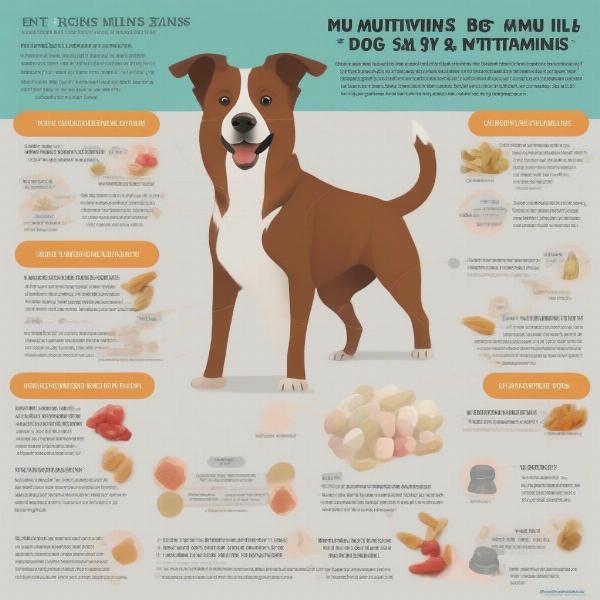Multivitamins for dogs can be a beneficial supplement to ensure your canine companion receives all the essential nutrients they need for optimal health. However, navigating the world of dog multivitamins can be overwhelming with so many options available. This guide will help you understand the importance of multivitamins, how to choose the right one, and answer common questions.
Understanding the Need for Multivitamins in Dogs
While a complete and balanced diet should provide most of the necessary nutrients, certain situations may warrant the addition of a multivitamin. Puppies, senior dogs, pregnant or lactating dogs, and dogs with specific health conditions may benefit from the extra nutritional support. Furthermore, dogs on homemade diets may require supplementation to prevent deficiencies. It’s crucial to consult your veterinarian before starting your dog on any new supplement, including multivitamins, to ensure it’s appropriate for their individual needs.
Choosing the Right Multivitamin for Your Dog
Selecting the right multivitamin for dogs involves considering several factors, including your dog’s age, breed, size, and overall health. Look for multivitamins formulated specifically for your dog’s life stage and any existing health concerns. Avoid multivitamins containing artificial colors, flavors, or sweeteners. Opt for high-quality ingredients and reputable brands that prioritize safety and efficacy. Always check the label for dosage instructions and follow your veterinarian’s recommendations. You can also consider multivitamins for dogs specifically formulated for certain breeds or health needs.
Key Nutrients to Look For
- Vitamins A, D, E, and K: Essential for various bodily functions, including vision, bone health, and blood clotting.
- B Vitamins: Crucial for energy production, nerve function, and red blood cell formation.
- Vitamin C: An antioxidant that supports immune function and collagen production.
- Minerals: Such as calcium, phosphorus, and magnesium, essential for bone health, muscle function, and nerve transmission.
Potential Benefits and Risks of Multivitamins for Dogs
 Benefits and Risks of Dog Multivitamins
Benefits and Risks of Dog Multivitamins
While multivitamins for dogs offer several potential benefits, such as improved energy levels, coat health, and immune function, it’s essential to be aware of the potential risks. Overdosing on certain vitamins or minerals can be harmful, leading to toxicity and adverse health effects. Always follow the recommended dosage and consult your veterinarian if you notice any unusual symptoms after starting your dog on a multivitamin. Remember, multi vitamins for dogs are supplements, not a replacement for a balanced diet.
Are Multivitamins Necessary for All Dogs?
No, not all dogs require multivitamins. If your dog is healthy and consuming a complete and balanced diet, they likely receive all the necessary nutrients. However, certain situations, like dietary deficiencies or specific health conditions, may warrant supplementation. Always discuss with your veterinarian before giving your dog any new supplement, including a multivitamin. They can assess your dog’s individual needs and recommend the best multivitamins for dogs uk if necessary.
Conclusion
Multivitamins can be a valuable addition to your dog’s health regimen when used appropriately. Always consult with your veterinarian before starting your dog on a multivitamin to ensure it’s the right choice for their individual needs and health status. Prioritize a balanced diet and consider multivitamin for dogs only when necessary.
FAQ
- Do puppies need multivitamins? While puppies typically receive essential nutrients from their mother’s milk and puppy food, some may benefit from a multivitamin, especially those with growth issues or dietary imbalances. Consult your vet.
- Can I give my senior dog a multivitamin? Yes, senior dogs can benefit from multivitamins formulated for their specific needs, as they may have different nutritional requirements.
- What are the signs of vitamin deficiency in dogs? Signs can vary depending on the deficiency but may include poor coat condition, lethargy, loss of appetite, and weakened immune system.
- What happens if I give my dog too much of a multivitamin? Overdosing can be harmful. Contact your vet immediately if you suspect your dog has ingested an excessive amount of a multivitamin.
- Can I give my dog human multivitamins? No, human multivitamins are formulated for humans and may contain ingredients toxic to dogs. Always use dog-specific multivitamins.
- Are there natural alternatives to multivitamins for dogs? Some natural food sources can provide specific nutrients, but a comprehensive multivitamin is often the most efficient way to address potential deficiencies.
- How should I store dog multivitamins? Store them in a cool, dry place away from direct sunlight and out of reach of children and pets.
ILM Dog is a leading international pet website dedicated to providing expert advice on dog care and wellbeing. We offer resources on various topics including breed selection, health, training, nutrition, grooming, and much more. Our goal is to empower dog owners worldwide with the knowledge and tools they need to provide the best possible care for their canine companions. For expert guidance on all aspects of dog care, contact ILM Dog at [email protected] or +44 20-3965-8624. Visit our website today at ILM Dog to learn more about how we can help you provide the best care for your furry friend.